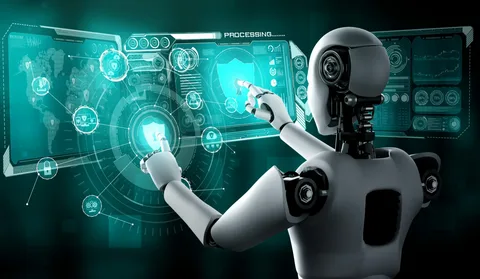
The global push toward automation, digital transformation, and data-driven decision-making is accelerating at an unprecedented pace, triggering explosive expansion across the Artificial Intelligence Market. Businesses, industries, and governments are adopting AI-powered systems to enhance operational efficiency, build resilient business models, and meet the rising expectations of hyper-connected consumers. From machine intelligence embedded in smartphones to enterprise-scale predictive analytics, the integration of AI is transforming how organizations function. As reported by leading analysts, including insights highlighted by Fairfiled Market Research, the global ecosystem for AI is evolving into one of the fastest-growing innovation fields of the decade.
At its core, AI is becoming the backbone of modern technological competitiveness. Organizations now view AI not as an advanced experimental tool but as a strategic necessity capable of improving accuracy, reducing costs, and enabling smarter workflows. This shift from optional adoption to essential integration is one of the strongest forces behind global market acceleration. Furthermore, AI’s ability to adapt across industries—healthcare, finance, retail, manufacturing, logistics, education, and more—has accelerated its acceptance worldwide.
Rising Enterprise Digitization Is Fueling Global AI Demand
Digital transformation is no longer a choice; it is a competitive imperative. Enterprises are investing heavily in cloud computing, data analytics, and intelligent automation platforms to streamline operations. AI is playing a crucial role in modernizing legacy systems, reducing manual complexities, and supporting real-time decision-making. As organizations accumulate massive datasets across their digital workflows, AI becomes indispensable for data interpretation, pattern recognition, and predictive modeling.
This rapid expansion happens because businesses increasingly understand the measurable results AI delivers—faster processing, enhanced accuracy, and automated decision-making. Even traditional sectors like agriculture, construction, mining, and energy are adopting AI-based forecasting, robotics, and monitoring tools. This widespread cross-industry integration strengthens the growth trajectory of the Artificial Intelligence Market, pushing deployment far beyond technology-specific domains.
Growing Investment in Automation and Smart Technologies
Automation lies at the heart of industry evolution. Companies are turning to AI to handle repetitive tasks, optimize labor costs, and enhance employee productivity. Smart technologies, including autonomous robotics, automated customer support, digital assistants, and robotic process automation (RPA), have become standard components in enterprise tech stacks. These intelligent systems can execute thousands of operations with minimal human intervention, maintaining speed, precision, and consistency.
Automation-driven growth is further supported by the increasing maturity of machine learning models. As AI algorithms become more efficient, scalable, and accessible through cloud platforms, small and mid-sized businesses are also participating in the AI revolution. This democratization of automation tools ensures that AI adoption is no longer limited to tech giants but is spreading rapidly across global markets.
Exploding Use of AI in Consumer Applications
The widespread rise of smartphones, IoT devices, wearable technologies, and smart home ecosystems has made AI an everyday experience for billions of people. From voice assistants that schedule tasks to personalized recommendation engines on e-commerce platforms, consumers heavily rely on AI-enhanced digital experiences. Streaming platforms, online retailers, navigation apps, and social media algorithms are powered by advanced AI models that understand user behavior in real time.
This surge in consumer-level adoption creates a ripple effect that boosts corporate-level investment. When customer habits shift toward smart, personalized experiences, businesses must evolve their technological infrastructure to meet these expectations. Consequently, industries worldwide are increasing spending on AI-powered personalization, customer analytics, and engagement platforms, driving structural advancement in the Artificial Intelligence Market.
Breakthroughs in Generative AI and Deep Learning
Recent breakthroughs in generative AI, neural networks, transformer models, and deep learning architectures have shifted the industry into an entirely new growth phase. These technologies can produce human-like language, generating visual content, predicting trends, enhancing cybersecurity, and even supporting drug discovery. Generative AI tools enable companies to accelerate research, improve content creation, and automate complex reasoning tasks that previously required human intelligence.
Enterprises are rapidly integrating advanced AI models into product development, marketing, creative functions, healthcare diagnostics, and engineering simulations. This level of sophistication was impossible a few years ago, but technological advancements have dramatically improved performance and scalability. Such progress ensures that the AI sector will continue expanding as innovation accelerates and more industries recognize the potential of generative systems for competitive advantage.
Supportive Government Policies and Global AI Ecosystems
Governments worldwide are establishing AI development policies, national AI strategies, and investment frameworks to strengthen technological capabilities. Countries in North America, Europe, and Asia are investing heavily in AI R&D, workforce training, innovation hubs, and digital infrastructure. Government support also includes regulatory frameworks that promote responsible AI usage, data protection, cybersecurity measures, and ethical governance.
Public-sector adoption is equally strong, with AI being deployed in public health, transportation, education, smart cities, and digital identity programs. States are investing in AI to improve public services, enhance administrative efficiency, and strengthen national competitiveness. These initiatives provide the foundation for long-term expansion in the AI ecosystem and further enhance confidence in global markets, as noted in findings referenced by Fairfiled Market Research.
Rise of Cloud Computing and AI-as-a-Service Models
Cloud-based AI services have simplified implementation for organizations, reducing infrastructure costs and enabling scalable deployment. Businesses no longer need extensive on-premises hardware; instead, they rely on cloud platforms that provide ready-to-use AI models, analytics tools, and automation frameworks. AI-as-a-Service allows companies to deploy intelligent solutions quickly and efficiently, regardless of size.
Major cloud providers offer pre-trained models, API integrations, and advanced computing resources that accelerate AI adoption across industries. These services are priced flexibly, enabling companies of all scales to access powerful AI solutions without massive upfront investments. The shift to cloud-native AI is one of the most influential factors driving exponential growth across the Artificial Intelligence Market.
A Technology Reshaping the Future of Every Industry
The global Artificial Intelligence Market is expanding rapidly because it provides unmatched efficiency, accuracy, and innovation benefits across every sector. Businesses are embracing AI to strengthen operations, improve customer engagement, reduce risks, and unlock new revenue opportunities. With advancements in generative AI, machine learning, automation, and smart technologies, the pace of innovation is only accelerating.
As enterprises continue their digital transformation journeys and consumers demand intelligent solutions, AI will remain central to global technology evolution. Supported by government initiatives, cloud adoption, and breakthrough innovations, AI is positioned to redefine industries worldwide—making its rapid growth not only expected but inevitable.
















